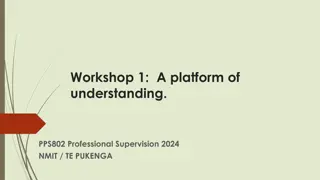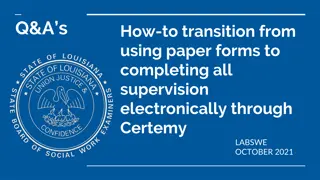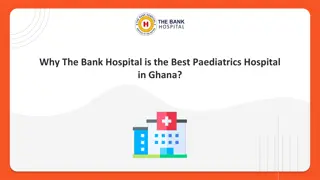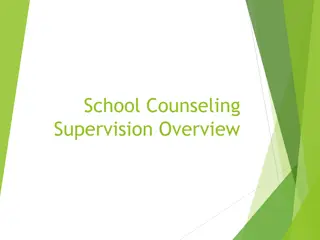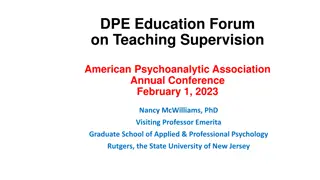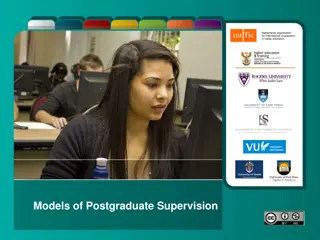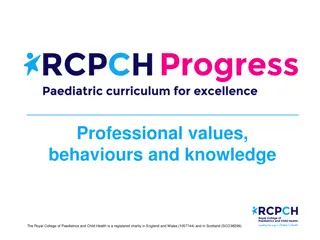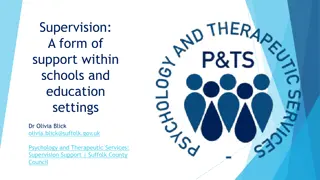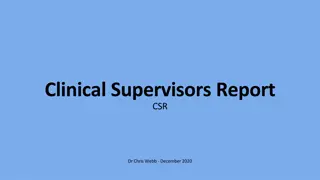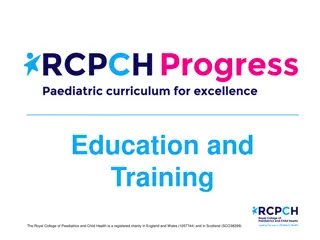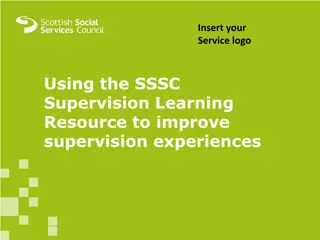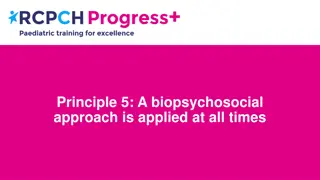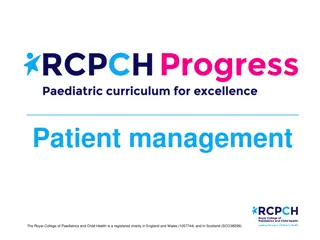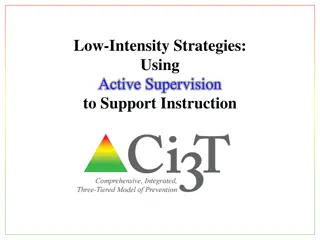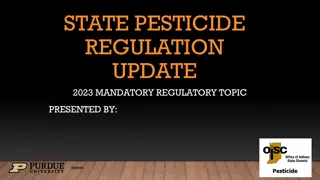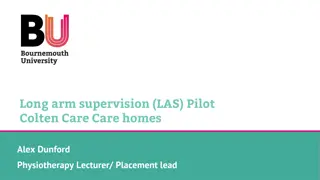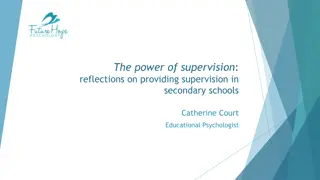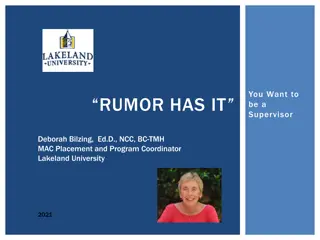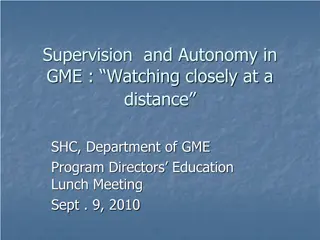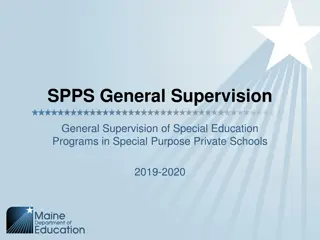Clinical Supervision and Training Updates in Paediatrics 2020-2021
This update highlights the roles of educational and clinical supervisors, focusing on supervision post-COVID19 and feedback. It covers aspects such as supervision structure, trainers' reports, and attaching evidence to curriculum domains for trainees. Key topics include exams, shape of training progress, meetings, reports content, trainee assessment, and areas of competency evaluation. The content emphasizes the importance of structured progress reviews and addressing trainees' development needs effectively.
Download Presentation

Please find below an Image/Link to download the presentation.
The content on the website is provided AS IS for your information and personal use only. It may not be sold, licensed, or shared on other websites without obtaining consent from the author. Download presentation by click this link. If you encounter any issues during the download, it is possible that the publisher has removed the file from their server.
E N D
Presentation Transcript
Educational and Clinical Supervisors Update School of Paediatrics 2020 -2021 Dr Kay Tyerman TPD
Overview: Supervision and ARCP Post-COVID19 Focus on Feedback RCPCH Updates: I. Exams II. Shape of Training Progress +
Supervision: Clinical Supervisor Educational Supervisor 1. Allocated by Department 1. Allocated by Tutor 2. Work with them, duration of post Facilitate short-term goals 2. May have worked with them, continuity through training Career Development & long-term goals 3. Meetings minimum of 3 x /6 month 3. Meetings - minimum of 3 x / year - Initial Meeting set objectives - Mid point - End of placement - Induction meeting + PDP - Mid-point review - End of year review 4. Need to complete CSTR for each 6 month post 4. ESTR in conjunction with CS - Clinical Ability & Progress - Other Professional Activities & Progress eg Governance, Teaching, Research
Trainers Reports: Type of Report: CSTR ESTR Trainee- led: Yes Yes Frequency: Every 6 calendar months Every 12 calendar months Content: Objective report based upon: 1. work-based assessments 2. Feed-back from colleagues/MDT 3. Clinical Skills & Performance 4. Professional Attitudes 5. Other Departmental Contributions In conjunction with CSTR: 1. PDP progress / Goals set at last ARCP 2. Mandatory Courses 3. MSF 4. Work-based Assessment 5. Trainee reflection 6. Structured review of progress Curriculum Domains 7. ARCP toolkit - use as checklist Conclusion: - - Has trainee met competencies? Are they able to progress to next level of training / CCT? Are there any specific training needs that need to be addressed? Are there any mitigating circumstances that need to be considered? - - - As per CSTR Highlight excellence Any specific development/career needs that should be highlighted to ARCP panel? Are they ready to undertake START? Has trainee addressed developmental needs highlighted by START? - - - - Mini Reference
Attaching evidence to Curriculum Domains (ESreport): - trainee should include specific examples 01 Professional Values and Behaviours Comment on level of responsibility, credibility and quality of reflections, can refer to developmental log and MSF 07 Patient Safety Refer to developmental log, HAT. Any involvement in an SI should have been reflected on and exception report completed and declared on form R 02 Communication 08 Quality Improvement General feedback received from assessments, MSF, START Evidence of QI activity, audit, again could use COVID and different ways of working (could link to above domain) 03 Procedures 09 Safeguarding Refer to skills log and assessments particularly important for neonatal posts If no Safeguarding CBD available in the current situation, identify other safeguarding evidence eg reflections in developmental log, attendance at peer review, completion of diploma Safeguarding module 04 Patient Management Refer to assessments, MSF, START, developmental log including clinical questions and reflections relating to specific cases 10 Education and Training Refer to developmental log. Should also include any feedback received for any teaching given 05 Health Promotion All trainees should have something in this given current situation re COVID. Other examples are breastfeeding, vaccinations, lifestyle advice etc 11 Research Include any work on guidelines, GCP, diploma 06 Leadership and Teamworking Especially important for level 3 trainees. Refer to LEADER CBD, MSF, START
Supervision post-COVID19: Virtual / Face 2 face supervision meetings SMART PDP adaptable to potential changes in working environment Support & Feedback Reset, Restore and Recover Flexible opportunities for learning: Work based assessments Clinical training remote consultations Teams teaching sessions/ meetings Remote delivery STEPP, Diploma Child Health, SPRAT Blackboard Platform
Resources: HEEYH Paediatrics Website Homepage HEEYH Paediatrics Appraisal and Assessment Webpage HEEYH Paediatrics ESR Guide 2020 RCPCH COVID-19 Guidance on Managing ARCP s National Decision Aid National Guidance on Coding ARCP s Guidance on completion of TOOT on Form R Derogation to Gold Guide 8
ARCP ARCP: A Annual R Review of C Competence P Progression Assess progress Feedback focussed on development Review CCT date Date for next ARCP
Satisfactory Progress: Satisfactory Progress: Outcome 1 Outcome 1 Achieving progress and competencies at the expected rate (Clinical) Achieving progress and competencies at the expected rate (Academic) Outcomes: Recommendation for completion of training: Recommendation for completion of training: Outcome 6 Outcome 6 Gained all required competencies (Clinical) Gained all required competencies (Academic)
Unsatisfactory or insufficient evidence (trainee must meet with panel) Unsatisfactory or insufficient evidence (trainee must meet with panel) Outcome 2 Outcome 2 Development of specific competences required - additional training time not required Outcome 3 Outcome 3 Inadequate progress by the trainee - additional training time required Outcomes: Outcome 4 Outcome 4 Released from training programme with or without specified competences Released from academic programme Outcome 5 Outcome 5 Incomplete evidence presented - additional training time may be required **Outcome 5 to be reviewed within 2-4 weeks.
RCPCH Guidance: RCPCH Guidance: ARCP panels should consider an outcome 10 only when the trainee has been unable to evidence components of the assessment pathway that are mandatory for progression to the next level of training because of COVID-19. Outcomes 10.1 and 10.2 recognise that progress of the trainee has been satisfactory and acquisition of capabilities by the trainees has been delayed by COVID-19 disruption. These are therefore 'no-fault' outcomes. COVID Outcomes:
Outcomes 10.1 & 10.2: Outcome: Description: Applicable to: 10.1 Progress is satisfactory but the acquisition of competencies/ capabilities by the trainee has been delayed by COVID-19 disruption. Trainee can progress. 1. Trainee is not at a critical progression point 2. Trainee is at a critical progression point in their programme but the RCPCH has mandated that the capabilities can be acquired at the next stage of training. Note: additional training time necessary to achieve capabilities will be reviewed at the next ARCP. 10.1 Trainee can progress. 10.2 Progress is satisfactory by the acquisition of competencies/ capabilities by the trainee has been delayed by COVID-19 disruption. Trainee is at critical point and additional training time is required. point and additional training time is required. 1. Trainee is at a critical progression point in their programme where there has been no derogation to normal curriculum progression requirements given by the RCPCH (eg RCPCH START assessment). 2. Trainee is at the critical progression point of approaching CCT and additional training time will be required before the trainee can complete their training. 10.2 Trainee is at critical
ARCP: Standard Panel: Standard Panel: COVID Panel: COVID Panel: Minimum 2 panel members including TPD/HOS Chair 3 panel members for previous outcome 3 or anticipated 4 Lay advisor for appeals only 2 x Educational Supervisors + TPD chair Associate Dean (outcome 3 or 4) Lay member (10%) Remote F2F for unsatisfactory outcomes All remote Outcome 5 only for missing form R
ARCP Standards: Standard Standard COVID COVID Outcome 10.1 Outcome 10.1 Trainee can move to ST4 without full MRCPCH if: 1. All MRCPCH theory exams are achieved. 2. Two MSFs have been completed during level 1 (ST1-ST3) 3. All curriculum capabilities for level 1 training have been demonstrated or, in the educational supervisor's report, have been observed in the workplace 4. There is a satisfactory COVID educational supervisor report declaring trainee is safe to move onto the middle grade (ST4) level at next rotation 5. The trainee has not completed any required life support training (or their life support certification has expired) but was unable to attend or book on a course due to cancellations Level 1 Level 1 KNOWLEDGE KNOWLEDGE exams/ fit for middle grade role fit for middle grade role Level 2 Level 2 plus AUTONOMOUS PRACTICE plus AUTONOMOUS PRACTICE general paediatrics, community, neonates Level 3 Level 3 plus LEADERSHIP plus LEADERSHIP ST7 START feedback senior skills and attitudes ST8 ready for CCT ready for CCT
- Form R (TOOT & Declarations) Form R (TOOT & Declarations), CCT calculator, GMC Survey Receipt, CV - Outcome last ARCP: any specific recommendations? - Supervision Meetings , CSTR x 2 + ESTR Supervision Meetings , CSTR x 2 + ESTR - PDP Assessing E-portfolio Evidence - Work-based assessments (mandatory SLEs - MSF MSF - Developmental Log, Skills log, Reflection mandatory SLEs) - Exams , mandatory Courses - CSAC Progress Report CSAC Progress Report - START
ARCP Outcome Form: Review: Review: Period assessed, number of WTE months training Plan: Plan: CCT date CCT date ( (calculate) Post Post- -pone pone >14 days out of training/ year OOP Bring forward if exceptionally rapid Bring forward if exceptionally rapid progress progress calculate) ST year reviewed End of training year review? Level completion? Progress satisfactory for this ST training year? Progress satisfactory for this ST training year? Achieving at level above? Achieving at level above? ST year next post ST year next post OUTCOME OUTCOME Reasons for outcome Reasons for outcome Feedback on Feedback on e e- -portfolio development development Next ARCP date Next ARCP date portfolio and suggestions for and suggestions for For LTFT doctors LTFT doctors: document evidence required to complete training year/level if this ARCP was not an end of training year review
ARCP Outcome Form Unsatisfactory Outcome: Reasons for Outcome: Reasons for Outcome: Plan: Plan: Missing Evidence/ Lack of Engagement: and/or: Competencies to be developed: Clinical: Clinical: Exam failure, Knowledge, assessment of patients, decision making, management of patients, technical procedures Strategy to develop competencies Evidence required for next ARCP for outcome 1 Anticipated outcome if evidence not present Referral to local TPD + Sign post for support Date of next ARCP: Date of next ARCP: Professional skills: Professional skills: time management, organisation, reliability Usually within 6 months Usually within 6 months To review outstanding competencies To review outstanding competencies For outcome 3 before the end of the extension For outcome 3 before the end of the extension Professional behaviour: Professional behaviour: communication, team working, leadership Additional Training time how much?
Competencies to be developed Strategies to develop competencies Signpost to support Evidence for next ARCP Single exam failure Successful completion of examination Department exam teaching Exam revision courses Exam specific coaching Signpost to exam TPD Chakra Vasudevan Success in examination Repeated exam Dyslexia screening and the above failure Occupational health referral Workplace wellbeing/ Take time
Competencies to be developed Strategies to develop competencies Signpost to support Evidence for next ARCP Clinical: Enhanced clinical supervision CBDs knowledge Additional training ACAT assessment of patients (simulation-based training) clinical decision making ability to execute management plans Clinical technical skills Additional training DOPs
Competencies to be developed Strategies to develop competencies Signpost to support Evidence for next ARCP Professional skills: communication verbal/ written Communication skills course HAT/ DOC Additional training Consider dyslexia screening Professional skills: time management organisation Time management course ACAT, MSF, Coaching CSTR, ESTR Professional behaviours: punctuality, reliability communication team-working respect for colleagues, patients & carers Coaching Reflective Enhanced clinical/educational note supervision MSF, CSTR, ESTR
Issues identified Strategies to manage situation Evidence Signpost to support for next ARCP Health: GP, Occupational health physical/ mental Workplace wellbeing/ Time out Consider reducing working hours Personal Workplace wellbeing/ Time out circumstances Consider reducing working hours
Communication - ES, CS, TPD (College tutor, DME +/- HR +/- Paediatric Support) Formal meeting Trainee+TPD+/- ES to communicate outcome (unless outcome 1) Trainee + ES to make plan Clear plan SMART objectives Document in e-portfolio Regular review with ES Post ARCP Support:
https://www.yorksandhumberdeanery.nhs.uk/ Exam Support Paediatric Peer Mentoring Scheme Paedspeers@gmail.com Counselling Workplace Wellbeing/ Take time Coaching SuppoRTT ( out of training > 3/12) Support What is available? https://www.yorksandhumberdeanery.nhs.uk/lea rner_support/supported_return_to_training
https://youtu.be/c_MdkLzfTDU Feedback https://youtu.be/F506D1PXXSg
What is feedback? The giving of specific information regarding observed behaviour with the intention of improving performance
Low-level frequent, brief and informal Levels of feedback Mid-level as part of the WBA process High-level at supervision meetings
Lacking Ineffective Excessively positive and avoids negative aspects Off the cuff negative Trainees and trainers are unaware of the benefits Apprehensive in seeking/giving feedback Trainers often fail to encourage trainees to seek feedback Face to face training needed Limitations and Challenges
Principles of effective feedback Establish a positive working relationship Demonstrate mutual respect Close and supportive clinical supervision Accessible and engaged in the learning process Give clinical independence within trainee s limits
Guided by self-reflection Directed towards agreed learning goals Specific, relevant and descriptive Non-judgemental and focussed on trainee behaviour Include a confirmation of the trainee s understanding of the content of the feedback Include an action plan for future learning goals Process of effective feedback
How can we improve Feedback ? Examples Give feedback after a busy shift verbal/email/whatsapp Consultant meeting collects trainee feedback and communicates this to trainees Consultant WBA clinic WBA for departmental teaching done by trainees
RCPCH Updates I. Exams II. Shape of Training Progress +
MRCPCH MRCPCH Written Written - Option 1: test centre social distancing - Option 2: at home/private space with online invigilation - AKP: September, January 21 - FOP/TAS: October, February 21 RCPCH Updates Clinical Clinical MRCPCH COVID Adapted Clinical Exam November 20 - Remote , Practique platform - https://www.rcpch.ac.uk/resources/mrcpch-covid- adapted-clinical-exam-information-hub#recent-updates- on-mrcpch-clinical-exam START START October 20, April 21 Remote, Practique Platform
Shape of Training Shape of Training Two level training programme 7 year indicative training time Core Speciality General Paediatrics and Sub- speciality Increased flexibility + OOPs Avoid sudden change tier 1 -2 rota RCPCH Updates: Submission to GMC Spring 2021 Move to Progress + September 2023
Trainees & SOP need you Feedback Reset, Restore and Recover Summary: Get ready for SOT Thank you
















